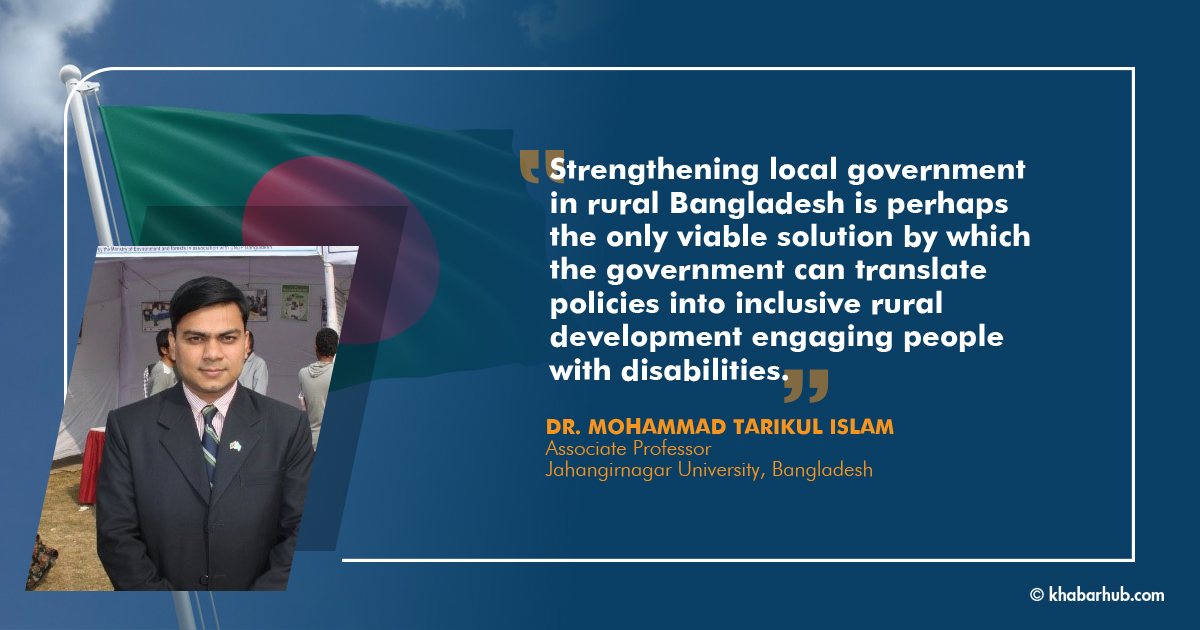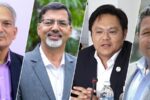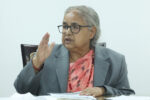As stated by the WHO (World Health Organization), because of natural disasters, road accidents, social and family violence, malnutrition, unavailability of vaccinations and congenital malformation around ten percent of the total population of Bangladesh is living with disabilities.
Negative attitudes in the social and environmental and institutional barriers are equally responsible to make them vulnerable and neglected class.
Particularly in rural areas of Bangladesh, disability is often viewed as a curse brought on by the misdeeds of parents, and is often believed to be contagious.
Let me signpost here the legislative development of the government of Bangladesh in brief.
Bangladesh is the signatory of the United Nations Convention on the Rights of Persons with Disabilities (CRPD) and ratified it soon after on 30 November 2007. On 9 October 2013, Bangladesh had passed a bill called the Persons with Disabilities’ Rights and Protection Act 2013 in line with the mandate of CRPD.
This law replaced the Disabled Welfare Act 2001.
In order to complement the efforts of the government, for safeguarding their rights and privileges, a good number of national and international organizations have also been actively advocating for the rights of persons with disabilities, organizing roundtables and advocacy activities, including with the media, to promote the rights of persons with disabilities and to encourage and facilitate their full participation in civil society.
By and large, standing committees are small groups of representatives who are assigned, on either a temporary or a permanent basis, to examine matters more closely than could the institution.
This paper briefly seeks to reveal the state of participation of the people with disabilities in the decision-making process for local sustainable development initiatives as well as to suggest the possible way forward for the improvement of the social participation of people with disabilities.
Apparently, local governance is viewed as a process of continuous construction of policy decisions, through the association of other stakeholders in ownership of the public project, based on more or less intense forms of relationship.
Citizen’s participation is widely used in the discourse of development for the last few decades. Meaningful participation of the people irrespective of gender, religion and people with disabilities has come to be recognized as an absolute imperative for development.
Since rural development is a people’s program, it is essential that people should take an active part in rural development activities.
As an essential pillar of a democratic and public service transformation, local government is where solving the problems of democratic development has to start.
One important way of strengthening democratic institutions without weakening the executive is to ensure active participation of the citizen in the rural development process by the way of making standing committees of the local government effective.
Standing committees allow the members to perform numerous functions that otherwise might not be conducted at all.
Their voices are not heard in the different platforms (for example; standing committee, ward meeting, project implementation committee, community policing committee, and open budget discussion) of the decision-making process of the local government bodies.
They help organizations to reduce their workload and perform different functions more efficiently with the formulation of rational decisions and providing an important means of oversight on the function of governing bodies.
For instance, Union Parishad is the lowest tier local government institution working for a long time for providing service to citizens at their doorstep.
It is the only institution to ensure good governance, development planning, implementation, transparency, and accountability for rural areas in Bangladesh.
By and large, standing committees are small groups of representatives who are assigned, on either a temporary or a permanent basis, to examine matters more closely than could the institution.
Standing committee s allow the representatives to perform simultaneously numerous important functions that otherwise might not be conducted at all.
Since standing committee s operate under less formal rules standing committee members can discuss issues informally and develop relationships with the standing committee colleagues who represent different interests.
That creates a collegial environment in which compromises on small matters and technical improvements in overall functioning can be agreed upon expeditiously.
The latest Local Government (UP) Act 2009 has created an opportunity to ensure greater participation of the people in the process of development planning and implementation.
According to the UP Act, 2009, there is a provision of 13 standing committees in the UP to support the Parishad in ensuring transparency, accountability, and people’s participation in planning and implementing for ensuring better governance and service.
As per the UP act, each UP is supposed to form at least 13 standing committees on different issues like education, health, family planning, social welfare and disaster management, and agriculture, fisheries and livestock.
The standing committee, comprising elected representatives from the Parishads, civil society members, socially respected persons, and women representatives of that locality, is entitled to assist the UP in ensuring better services and resolving different problems.
For instance, the standing committee helps drive decision and provide an important means of oversight on the function of governing bodies.
Strengthening local government in rural Bangladesh is perhaps the only viable solution by which government can translate policies into inclusive development and prosperity.
However, these standing committee s are not active in about 80 percent of the Parishads because the elected chairmen and other members are not properly aware and interested in its functions and jurisdictions.
The reasons behind the sluggish performance of standing committee s may be attributed to several factors such as lack of initiatives of UP members, lack of pressure from the common people, lack of political pressure, lack of skills required for planning and implementing development programs at the local level, no specific terms of references of the standing committee, unwillingness on the part of UP Chairman to delegate authority and even existence of standing committee or existence only on paper.
Moreover, all the standing committees are not represented by people with disabilities. Their voices are not heard in the different platforms (for example; standing committee, ward meeting, project implementation committee, community policing committee, and open budget discussion) of the decision-making process of the local government bodies.
Sustainable development can be viewed as an integrated agenda and fundamental principle that endeavors to provide solutions to economic, social and environmental challenges.
The 2030 Agenda emphasizes the need for an inclusive and localized approach to the Sustainable Development Goals (SDGs).
Equal and active participation of persons with disabilities in all spheres of society and create enabling environments by, for, and with persons with disabilities, in line with the Convention on the Rights of Persons with Disabilities are one of the driving forces of SDGs.
The pledge to leave no one behind is embedded at the heart of the Sustainable Development Goals. Bangladesh’s rural economy, and specifically agriculture, have been powerful drivers of poverty reduction in Bangladesh since 2000.
Investment in and expansion of the rural non-farm enterprises is a parallel priority of the Government of Bangladesh.
Spanning from day-to-day life to the broader sectors of agriculture and other economic activities, the Bangladesh villages have long entered the phase of a revolution.
Localizing SDGs for the sake of qualitative change in the lives and livelihood of the village dwellers including the people with disabilities (above 62% of the total population in Bangladesh) is essential.
Local government not only ensures improving access to basic services for the people with disabilities but provides an effective platform for them to participate in the decision making and development process undertaken for them.
Functioning in an environment where communities are inclusive supports that essential cohesion, helps with fair and effective service delivery for ensuring a positive environment for sustainable development.
Strengthening local government in rural Bangladesh is perhaps the only viable solution by which government can translate policies into inclusive development and prosperity.
The endeavor of the Bangladesh government toward the “localization” of global agendas is progressively expanding to the grassroots level.
To upscale efforts, we need greater cooperation and national and international coordination mechanisms, as well as enough resources to make this happen.
We will need to ensure that citizens including people with disabilities are involved in the decisions that affect their future.
“Effective, accountable and transparent institutions” and “responsive, inclusive, participatory and representative decision-making at all levels” require a clear institutional framework, reinforced management and planning capacities, participatory mechanisms and regular financial negotiations between all levels of government and local communities to define priorities and plan of action.
Local government in this regard is an important entity to the development of inclusive communities.
Ensuring that local communities remain cohesive, with fair and effective service delivery is even tougher.
Functioning in an environment where communities are inclusive supports that essential cohesion, helps with fair and effective service delivery for ensuring a positive environment for sustainable development.
We must strive to foster dialogue with all stakeholders through the Local 2030 initiative and to mobilize a multi-level coalition around localization, which can accelerate our efforts while setting enabling national frameworks that empower people with disabilities to develop and lead their strategies aligned with the SDGs.
(Dr. Mohammad Tarikul Islam is an Associate Professor of the Department of Government and Politics at Jahangirnagar University in Bangladesh. He is the Visiting Scholar of Oxford and Cambridge. Before joining the university, Dr. Islam was serving the United Nations for seven years. As a popular development columnist in South Asia, Professor Islam writes for the LSE South Asia Blog, Oxford Political Review, Cambridge Global Human Movement Blog, Oxford Department of International Development Blog, the Khabarhub, the Daily Star, the Daily Independent, the Financial Express, The Business Time, the Daily Jugantor and the South Asia Monitor regularly)









Comment